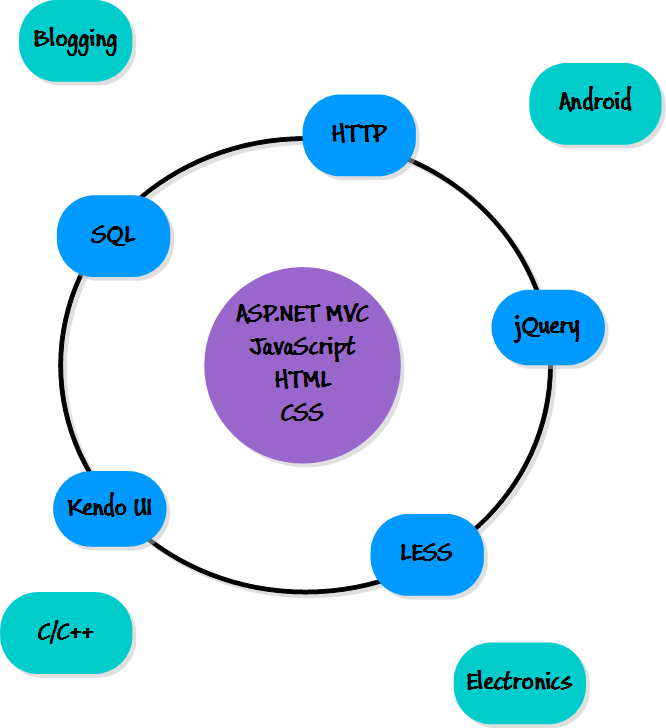Taking control of your learning by mapping out your skills
In my previous post, I wrote about what pushes you to learn to help you understand if learning a given skill is the best use of your time or if you’re just reacting to the deluge of information in the tech world. But, how do you know what is the best use of your time? What if you’re not sure about where you are and where you are going?
If you’re like most of us, many of your skills were learned by chance depending on the jobs you took, and not as a deliberate choice. But if you want to invest your free time learning skills that will be valuable to you, you don’t want to learn skills at random. You must take control and learn things that will help you go in the direction of your choice.
To know what’s missing, you must first must map out what skills you do have. Here is a map of a few of my skills as a web developer you can use to build your own:

In this map, skills are broken down into 3 categories, each having a different use :
Core Skills (in purple)
Those are the skills that you use every day and that you must master to be a strong developer in your domain. For a web developer, core skills are your current tech stack and the basic building blocks of the web: HTML, CSS and JavaScript. Ideally, those skills must be strong before moving on to learn the two other kind of skills.
Satellite Skills (in blue)
Those skills are still important, but they’re not a must have for everyone and may vary according to your experience and the projects you’re working on. For example, SQL may be a core skill if you’re interacting directly with a database, but if you’re using a ORM (object-relational mapping) tool you may not need to master this right away as a newcomer to be effective.
Helper Skills (in turquoise)
Those skills are not directly related to your core skills or satellite skills, but they are valuable as a way to solve problem that are not directly related to your skillset, communicate better with people in other disciplines and broaden your horizon. This also includes soft skills such as speaking and blogging that help you leverage all your other skills.
Analysing the map
Just by writing down this map, you’ll probably notice some areas where you are weaker and need to put in some work, and missing skills you should learn. Unfortunately, maybe you’ll find out that you what you mapped is not close to where you want to go and that you’re due for a total overhaul. In that case, you’ll need to work on building a new map to help you go in the right direction.
But, in any case, which skill should you learn next? When you’re choosing to learn a new skill, you should focus on something that will make the rest of your skills stronger and more valuable. Depending on what’s pushing you on the most, what you’ll want to learn will vary: if you’re someone who loves to know the latest and greatest technology and the FOMO is pushing you, be someone who takes advantage of being on the cutting edge. The same can be said if you would rather have stability and learn a language in-depth, or want to grow into a different role and responsibility.
In the next post, I’ll discuss how to narrow down which skills you should learn without being overwhelmed by all you could learn.
February 27, 2016 @ 08:27
I like your blog .. its full of valuable information.
Please put a link to your next and previous posts.
Thanks,
Ahmed.
February 27, 2016 @ 12:07
Thank you, I’ll see what I can do about the Previous/Next links!
Avoid JavaScript Fatigue: Make a Learning Map | Code Newbie in Pittsburgh
June 9, 2016 @ 16:58
[…] How do you avoid the never-ending rabbit hole of jumping from one technology to another? Cindy Potvin came up with a solution I am going to talk about here: making a learning map. […]